All products are independently selected by our editors. If you buy something, we may earn an affiliate commission.
Not all relationships last—some are more of the “learning love” kind. But breakups are rarely easy. As a sex therapist and relationship expert turned neuroscientist, I often hear from people who regret breaking up. It’s what I call a breakup hangover: when we end up being awash in feelings of regret after deciding to let go of a relationship.
Having regrets postbreakup doesn’t necessarily mean that you should get back together with your ex or that you made the wrong choice. We’re wired to feel bad when we experience the loss of a relationship, even if we’re the one who initiated the breakup. Longing, sadness, and grief are all exquisitely wired into our emotional instincts, and they can help us lean into doing the work of growth as a person. That’s good news! Regret is part of grieving, and as I like to say, breakdown often means breakthrough.
“Oftentimes people break up because they’re feeling specific things, and then they miss the nice parts of the relationship and feel sad that they broke up,” says Alexandra Stratyner, a licensed psychologist at Stratyner and Associates in New York City. “But it’s not necessarily about the other person. Sometimes it’s just about the fact that it feels nice to be in a relationship.”
So, pause. Do some accounting for yourself. Reflect on why you have regrets and what’s driving this desire to get back together with your ex. “If you ultimately discover that you do continue to have strong feelings for them and can put aside what didn’t work the first time, then I would consider reaching out,” Stratyner says. “But I would do so while trying to think about how this is going to be for the other person too. Am I overstepping boundaries they’ve set with me? Am I doing something that may be emotionally painful for them? How can I do this if I’m going to proceed in a way that is respectful?”
The most respectful way to proceed, in truth, is to do the work on yourself first after heartbreak. Here’s what that looks like…
How to recognize if you have regrets
Short answer: We ruminate.
Longer answer: We tend to think about loss in the same way we ruminate about new relationships.
On the upside of new love, we think about that person all the time—and those thought loops can be very exciting and pleasurable. But even under the influence of new love, our inner dialogue can reverberate with concerns, fears, and worries about perceived threats to the relationship. We are creatures of attachment, and loss looms large for us.
When we break up, it’s not unusual to experience a similar kind of rumination, in particular when we aren’t feeling complete and there’s more work yet to be done. It’s normal, in other words, to regret breaking up—even if you’re the one who did the dumping. Relationship healing, as it turns out, is an inside job that needs to happen even if the particular relationship doesn’t continue.
How to handle breakup regrets
Ask yourself these questions: Was breaking up an in-the-moment decision? Or was it brewing for a longer time? Is life better after the breakup? Worse? Unchanged? Was the relationship not working because the partner was not treating you properly?
Don’t be afraid to get feedback from people who know you well, like a best friend or family member. How did they see you reflected in the relationship?
If you find yourself wanting your ex back, regardless if you were the dumper or dumpee, write down all of the reasons why you broke up in the first place before even considering reaching out. “A lot of times we break up with someone, and then all of a sudden our memory only serves as the highlight reel of the relationship, which makes many of us regret the breakup,” says Yue Xu, a relationship expert, cohost of the Dateable podcast, and coauthor of the upcoming How to Be Dateable (out January 28). “Then you go running back to the ex, and the same problems persist.” After you write everything down, give it some time—two weeks at least, she says—before contacting them. You may find your perspective has changed in that time.
If you’re still searching for clarity, look back. Were there any signs or symptoms of an unhealthy or toxic relationship? Without assigning blame, see what dynamics led to your relationship dissatisfaction and influenced your decision to leave. Were you or your partner judgmental? Did you not give each other the benefit of the doubt? Did you not appropriately take a stand for what you needed in the relationship? Did you tend to make your partner wrong when most of what couples fight about is simply a matter of opinion? Take full responsibility for your part of the dance.
As I tell couples in counseling, we each have 100% responsibility for what shows up in a relationship. That’s great news, since that means we can change things for ourselves going forward.
It’s perfectly natural to have regrets even if you know the breakup is the best thing for you. Recognize that what you’re feeling is normal and doesn’t necessarily mean you made the wrong decision. Don’t beat yourself up.
This is a good time to practice radical acceptance. The ability to tolerate our feelings, even the painful ones, is a sign of emotional health and a necessary skill for good relationships.
In general, are you an anxious person who tends to self-doubt? And if so, is the issue really regret about the loss of the relationship or simply concerns about your own decision-making?
Or, if you’re being completely honest, do you see a pattern repeating across your past relationships? Do you tend to make decisions from insecurities or fears? If so, take time to explore your attachment style as well as the particular way you view your own needs and anticipate how willing other people will be to help you meet them before entering into the next relationship. To dive even deeper, read my book Why Good Sex Matters to help you better understand and operate your own attachment wiring.
Have a look at some of these relationship skills that people who do relationships effectively practice. The good news is that these skills can be learned. Each healthy relationship holds an opportunity to learn more about yourself, how to partner with another, and for each of you to become a better person in the process.
Through understanding aspects of your own relational road map, you can become a more complete person going forward. One tool is to think about how we, as a culture, view what we expect of ourselves and each other. Regardless of your gender or sexual orientation, there are power struggles that go on in our relationships that are heavily influenced by old, outdated notions of gender roles and expectations that drive conflict. So for example, if you tend to think it’s your job to be nurturing (typically feminine role), and you aren’t nurturing yourself, you’ll probably develop resentment. Likewise, if your partner thinks it’s your job to do most of the heavy lifting to provide for your family (typically masculine role) and you don’t, they’ll probably resent you.
If you tend to be impulsive and rush into action without contemplation, you might be too quick to end a relationship and move on. Hence regrets. One aspect of our relational selves that could be better developed in us all is the “passive” role, or the ability to observe ourselves and each other with curiosity and insight without rushing into action or reaction.
The bottom line is that the more conscious and more flexible we are about what we expect of ourselves and each other, the better relationships will flow.
Now that you have a better handle on what led to the breakup, think about organizing a conversation with your ex to explore what needs to be done in order for you to walk away feeling more complete with the relationship. See if you can find a way to let go with love.
Just be sure to communicate your intentions before entering into any conversation with an ex, whether you’re seeking closure or looking for a second chance. “If you are reaching out, there needs to be a goal of why you’re reaching out,” says Julie Krafchick, a relationship expert, cohost of the Dateable podcast, and coauthor of the upcoming How to Be Dateable (out January 28). “Just saying, ‘I miss you’ or ‘I’ve been thinking about you’ is very confusing to both parties. There’s no clear action from that. So be vulnerable—if you’re still thinking this person is someone you want to reconcile with, say, ‘I’ve been thinking about it, and I feel like maybe we hastily ended this relationship. Would you be open to meeting up to talk about possible reconciliation or exploring this again?’ Being really transparent is important so everyone’s aware of what this reach-out actually means.”
However, you still need to respect where the other party is emotionally. “If they don’t want to speak with you, and they’re not interested in rekindling or even having a conversation for closure, that may mean the door is closed,” says Stratyner. “You don’t want to push or pressure people in a way that makes them uncomfortable. You have to be respectful of their agency.”
If it’s not possible to talk in person, you can get closure for your broken heart by writing down your thoughts and feelings, incorporating what you’ve learned from the relationship and the breakup. You can send the letter (or not). The most important thing is getting clear on your own growth through this experience so that you are one step closer to creating lasting love—whether that’s with your ex or someone new.
Nan Wise, PhD, is an AASECT certified sex therapist, neuroscientist, certified relationship expert, and author of Why Good Sex Matters: Understanding the Neuroscience of Pleasure for a Smarter, Happier, and More Purpose-Filled Life. Follow her @AskDoctorNan.
.gif)

